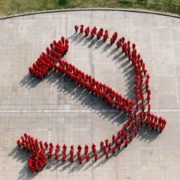The prospect of a framework agreement between China and the Holy See is creating a lot of controversy in the American press, and professor George Weigel in a recent article in Foreign Policy argued that the Holy See’s “Ostpolitik” with the Soviet bloc from the 1960s until 1989 was a total failure and backfired for the Vatican. He quoted Soviet documents proving the deep infiltration of Soviet agents into the various Catholic agencies. So would the new Ostpolitik with China, he reasoned.
From the perspective of Holy See, wishing to normalize ties with China for many years, we would hope that Beijing believed professor Weigel, and that the Soviets had told Beijing to improve ties with the Vatican in order to infiltrate liberal democracies and turn the Holy See into some kind of Trojan horse against the West.
Apparently, Soviet agents didn’t say so to the Chinese, and in fact this is not the moral the Chinese took from the role played by the Holy See in the collapse of the Soviet empire.
For over 20 years, we’ve discussed with Chinese people of all stripes a possible normalization of ties with the Holy See. There is but one constant refrain: The Pope brought down the Soviet empire and undermined it from within, voiding the communist ideals.
This is a crucial point for China. Power comes from the barrel of the gun, as Mao crudely put it, but what makes that barrel fire or not is the will of the people with their fingers on the trigger. If they stop believing in the reasons to pull the trigger, the gun is useless. Catholic faith touches on those reasons and thus can be far more insidious and dangerous than any other attack on the regime.
This argument has bogged down talks for ages and bugged me for decades. The only way out, on the suggestion of a brilliant senior prelate at the Vatican, was to tell the truth: Yes, the Holy See had a role in bringing down the Soviet bloc, but it also saved Cuba. The situation was different there and then.
That was not an empty accusation or boast (depending on from where you look at it), but it is confirmed by a concrete fact: Soviet agents tried to kill newly elected Pope John Paul II, as they considered him a paramount challenge to the Soviet regime.
Now we can argue that those agents were paranoid, as the Chinese are paranoid, but even paranoia has its reasons. In this case, it is that the Catholic faith can reach the nerve of the finger on the trigger and thus voids the threat of the barrel, as Mao would put it.
Therefore one should really ask, why China is taking such a huge gambit now? Why is China’s president Xi Jinping willing to take on this immense risk, from his point of view?
This would open a real field of exploration. However let’s leave it aside for the time being, and let’s think at the issue from another side.
Say we look at North Korea. Yes, there are military preparations, but diplomacy is also working to find a possible way out.
Let me say here that perhaps Beijing is a little better than Pyongyang, and as far as I know nobody is actively preparing for a military strike against China, a possibility conversely widely discussed about North Korea.
So why refuse to engage China in a most sensitive field, that of ideals and religion? Diplomacy works with (deranged?) Kim Jong-un; why not with (sane) Xi Jinping?
What is puzzling – to say the least – from the vantage point of talking to Chinese about this for so long is the sudden barrage of opposition from some Western quarters. What are these people afraid of? Yes China can be evil, but the Church was born by talking to evil people. If we believe that Jesus is God, as God he could have turned us all to angels and brought paradise on Earth. But he let himself be crucified and spoke with his torturers, the Romans. (See also Can Zen forgive all those who have sinned on China?)
The Chinese didn’t crucify Christ at least.
This barrage doesn’t incorporate the reasons of the Church, and for this we have to apologize. The Church apparently didn’t do a good job in communicating them, but the main thrust was explained in Gianni Valente’s interview with Secretary of State Cardinal Pietro Parolin.
Yet the Church ought to be thankful for this criticism. It helps like nothing else to explain to the Chinese that the Church has no political agenda and is not under anybody’s thumb.
In any case, the Church is not against anybody. It is not against China, and it is not against professor Weigel. The Church wants to be a field hospital, as the Pope put it. It wants to help everybody, and it doesn’t want to be dragged into a war, be it cold or hot. The Church doesn’t want crusades against the Muslims or the “Chin-coms” or different religions. So if there is some room for talk, for a peaceful solution, and for coming together, why refuse it?
The inability to answer satisfactorily and in good conscience this question has kept us going in China for many years. This we can offer to the skeptics of a future agreement.
Francesco Sisci has talked to both Chinese officials and scholars and people of the Holy See about normalization of ties; father Francesco Strazzari has been involved in work with China and previously with countries of the former Soviet Empire.






Points are well taken. If there is room for a peaceful solution between Holy See and China, why not? It deserves a benefit of doubt to say the least. China, go for it!